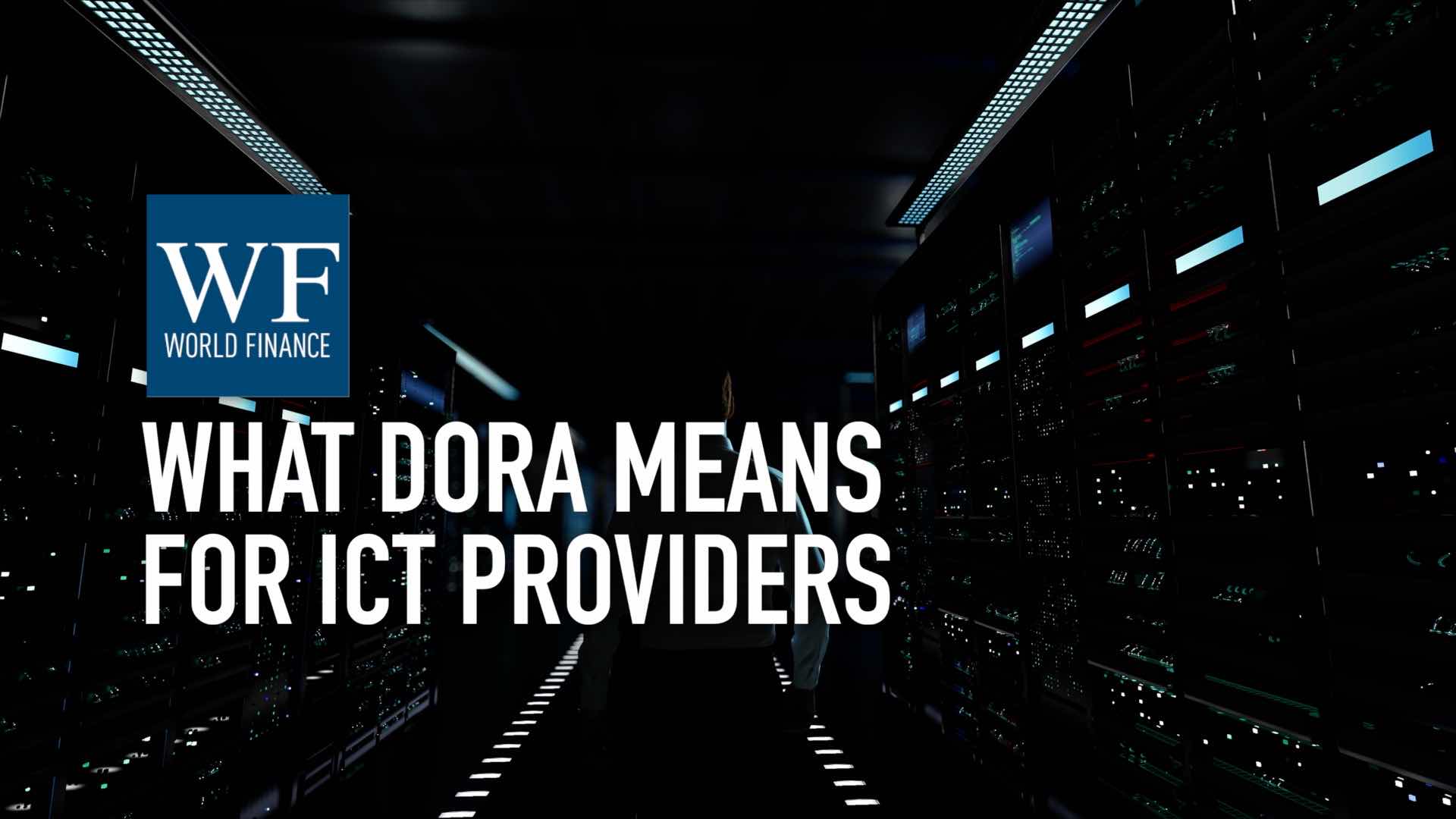Alex Brummer: banking system is ‘still living on crack cocaine’
The financial journalist and author of new book Bad Banks calls for a return to "plain vanilla utility banking"
Related:
Transcript
Six years on from the financial crisis, and the banks are still seen as villains. But is the reputation fair? One man who has been deeply critical of the ways in which banks have conducted themselves is Alex Brummer, financial journalist and author of Bad Banks: Greed, Incompetence and the Next Global Crisis. World Finance speaks to the writer to hear this views on why we need – in his words – a return to “plain vanilla utility banking”.
World Finance: Well Alex, everyone’s pointing fingers at banks, but are they as bad as people make out?
Alex Brummer: The record is pretty bad, and hasn’t got any better. You’d have thought that, you know, six years after the crisis, things would have calmed down, but there’s scarcely a day when there’s not some sort of regulatory action against the banks, and some new problem that we find.
Most recently we found a problem in the area of stock market trading, in a mysterious area called dark pools. And so there’s always a new area where intervention is taking place.
World Finance: As regulators and governments have tried to stabilise the industry, skeletons have come out of the closet. But surely that was inevitable?
Alex Brummer: I don’t think it was inevitable! I think that what’s interesting is that a lot of this behaviour took place since the financial crisis.
So we had the crash, which was 2007-8-9, that was a huge shock to the financial system; many of the banks had to be bailed out by governments. But many of these new actions which we’re finding – problems in the foreign exchange markets, problems in dark pools, problems of selling products to consumers which they shouldn’t really be buying – have come up since the crisis.
So that suggests that none of the lessons that they learned in the period leading up to the crisis have been learned!
World Finance: Well regulators have been working very hard to get rid of bad habits, so, have banks now cleaned up their act?
Alex Brummer: A lot of this is a kind of wash, an attempt to sort of, look better than they are, that the culture is changing and so on.
[T]here’s scarcely a day when there’s not some sort of regulatory action against the banks, and some new problem that we find
I also think that the regulators have changed their attitude too. I always regard it a bit like a football match, where the referee didn’t give a penalty in the first half, but now he’s giving out lots of penalties because he realised he was too soft in the first period of the problem.
And so that’s why a lot of these things, these skeletons, as you referred to them, are tumbling out of the cupboard.
World Finance: So which banks would you say are the worst? In your opinion?
Alex Brummer: I don’t know, I mean – a case for measuring that. But you could look at some of the fines which have been levied.
So one of the banks which came out of the crisis most strongly – JPMorgan Chase in the US – has actually now had the biggest fines on mortgage securities. It paid fines of $17bn. BNP in Paris, that paid a fine of $9bn.
Here in the UK, Barclays have been involved in almost every scandal you can think of: interest rate fixing, foreign exchange market fixing, a problem in the gold market, a problem in the dark pools which we referred to before – that’s the shared dealing markets in the US. Almost every area of activity that they’re involved in, they’ve had some disciplinary action.
World Finance: Well you talk about interest rate fixing, mis-selling, dark pools for example; some of these practices aren’t illegal, and there’s definitely a grey area there. So what’s the problem?
Alex Brummer: We have to be very careful here, because many of these cases now are actually being looked at by prosecutors. In particular the activities in the foreign exchange market, in the activities in the Libor market. A number of people have been arrested, a number of people have been charged. And we’re waiting for some of these cases to come to court as we speak now.
So in fact, that does suggest that there was some measure of illegality that went on. Although it’s only allegations at the moment.
World Finance: So where did it all go wrong? Do you think it was a case of bankers just thinking they were invincible?
Alex Brummer: I think that they live in a world of their own. I think that they feel that there is a kind of sense of entitlement in the banking world, and the bonuses in the banking sector drives a very bad culture. So the profit motive is far too strong. People are incentivised to push the boundaries as far as they can to try and improve performance and improve their bonuses.
I think if we controlled the bonus culture, made it much more long-term, that would be a big start in cleaning up the whole process.
World Finance: Well there were other industries that exposed economies on a large scale: insurance or other brokers. Are they equally to blame?
Alex Brummer: In the past they too have been involved in big mis-selling scandals. They were involved in the wrongful selling of endowment policies, the wrongful selling of private pensions to people in the public sector. So they’ve made big mistakes in the past.
I actually do think that they have cleaned up their act quite a bit. We’re seeing much fewer complaints. But you do get complaints about the way insurance is sold and so on. But it’s on a much lesser scale. And I think the banking system is where it’s really gone badly wrong.
World Finance: Now do you think there’s a case that maybe banks have had a little bit of unfair publicity? Because they were after all working under the remit of governments? So surely they should be to blame?
[T]hese skeletons, as you referred to them, are tumbling out of
the cupboard
Alex Brummer: I just think that they got out of control. While the profits were flowing in, nobody complained. When the public had to pick up the pieces? After the financial crisis, here in Britain we had to pump a trillion pounds into the banking system. A lot of that we haven’t got back.
People forget that we still own, all these years afterwards, 80 percent of the Royal Bank of Scotland. We still don’t know the story of what happened to HBOS. So you feel we’re part of a kind of conspiracy, in which the taxpayer is picking up the bill. The bankers walk off with the profits, and the taxpayer picks up the bill every time.
World Finance: So who would you say are the major players today, and are we just waiting for more scandals to hit?
Alex Brummer: We just don’t know; the regulators are looking at a whole series of things which they’ve never looked at before. So one of the things that has tumbled out of the cupboard most recently is the breaking of financial sanctions.
So, governments throughout the world, through the UN, have taken steps to prevent the flow of finance to countries like Iran, to Sudan, to Al-Qaeda and so on; and it now looks like a number of banks – BNP Paribas and HSBC are allegedly involved in this, Standard Charter here in the UK are allegedly involved in this – a number of banks have set up whole, complete systems to circumvent laws which have been put in place by governments, by the UN, by the European Union, in order to go around that to make money.
And those particular cases are now coming up now very strongly.
World Finance: Well you have suggested that we haven’t resolved the problems that led to the credit crisis six years ago, and in fact we could be headed for another one. How can we avoid this?
Alex Brummer: Probably the way we’re going, which is to try and change the culture of the banks, change the behaviour of the banks, and change the focus of the banks.
What we really need to focus on is what banks are there for. They’re there to take deposits; they’re there to make loans to companies, corporations, small businesses and individuals.
What we’ve seen is, the banks have found these other activities in financial markets, speculation of one kind or another, to be much more profitable. And so the rollback of trading on your own behalf, principal trading by banks – that’s a very important development.
And what I would like to see is a return to plain, vanilla, utility banking. Where banks do what they’re meant to do.
World Finance: Well finally your book says that the failings of the world banking system are threatening to undermine the future security of economies. How exposed are we?
Alex Brummer: We’re still living on – I suppose you’d call it crack cocaine. The US Federal Reserve has been pumping trillions into the market. It’s still doing so, and it will be doing so for most of this year, until the autumn of this year.
The problem is, when that stimulus is removed, we may see some more cracks in the system. In the emerging markets, some of the weaker banks in Europe which have still to address their serious problems. And so I think we may feel we’re getting better – prosperity is returning, the financial system is becoming normalised again – but I feel that when that artificial stimulation is taken away and the interest rates return to a proper level, we may have another series of problems. Particularly in the emerging markets.
World Finance: Alex, thank you.
Alex Brummer: Thank you.

 What the Digital Operational Resilience Act means for board members and CEOs
What the Digital Operational Resilience Act means for board members and CEOs What the Digital Operational Resilience Act means for third party ICT providers
What the Digital Operational Resilience Act means for third party ICT providers
